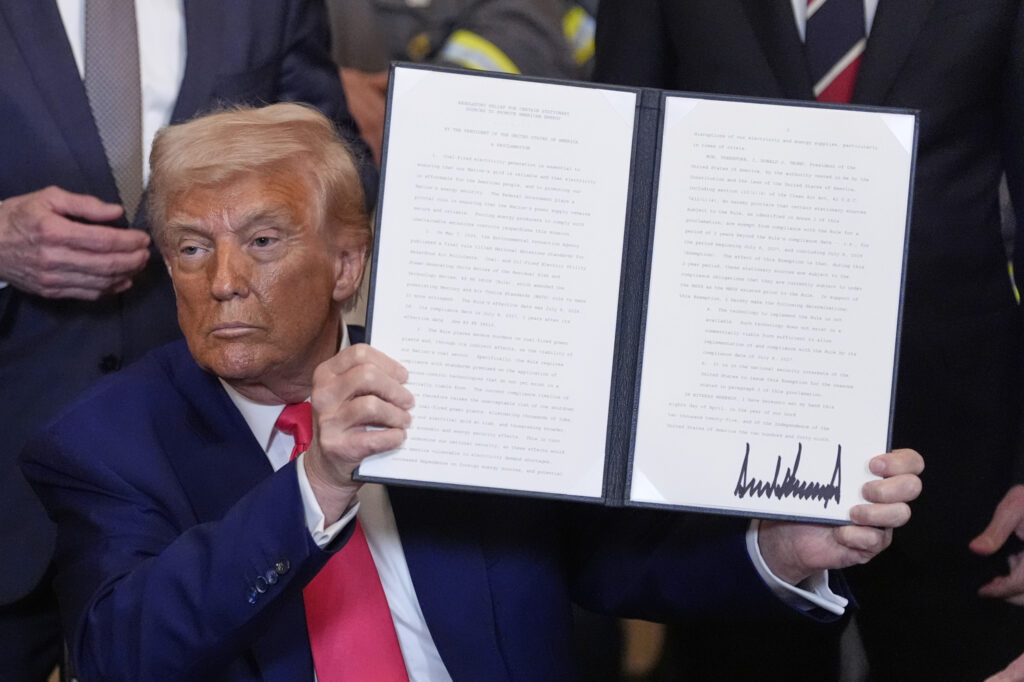President Donald Trump is seeing a notable dip in support from within his own party, as new polling shows his approval rating among Republicans is on the decline.
Why It Matters
Trump’s enduring popularity within the GOP has been a defining force in Republican politics, but even a slight decline in support could signal shifting dynamics ahead of the midterms in 2026. If his grip on the base weakens, it could open the door for rival voices within the party and complicate efforts to unify around a midterm strategy.
What To Know
New polling data from Quinnipiac and The Economist/YouGov reveals a slight decline in his approval rating among Republican voters.
Quinnipiac’s new poll, conducted between April 3-7 among 1,407 registered voters, shows that Trump’s approval rating among Republicans currently stands at 86 percent. That is down marginally from Quinnipiac’s last poll, conducted between March 6-10 which put Trump’s approval rating among Republicans at 89 percent. However, while his approval rating has declined slightly, his disapproval rating has remained the same, at 9 percent.
The latest poll had a margin of error of plus or minus 2.6 percentage points, while the March poll’s was at plus or minus 2.8.
Meanwhile, polling from The Economist/YouGov, conducted between April 5-8 among 1,741 respondents, also showed a small dip in support for Trump among Republicans, with 90 percent approving, down from 93 percent in the previous poll. His disapproval rate has also risen from 5 percent to 8 percent. Both polls had a margin of error of +plus or minus 2.9 percent.
Trump has seen his approval rating dip in recent days following the announcement of his “Liberation Day” tariffs on April 2, which included a sweeping 10 percent baseline tariff on all imports and harsher duties targeted at what the White House called the “worst offenders” of unfair trade practices.
The announcement immediately shook financial markets. Trump announced a surprise 90-day pause on most reciprocal tariffs just hours after they took effect on Wednesday. The 10 percent baseline tariff remains in place, and Trump has now raised duties on Chinese imports to 125 percent after Beijing responded with an 84 percent surcharge on U.S. goods. China has now responded in kind with its own 125 percent tariffs.
But despite the partial pause, polling data suggests the damage to Trump’s public standing may already be done.
The YouGov/Economist poll shows Trump’s net approval on economic issues has slipped to -10 from -3 in the previous poll. And on inflation and prices, his net approval has dropped to -19 points, down from -13 a week ago.
Among Republicans, Trump’s approval rating on the economy has also dropped, with 83 percent now approving, down from 89 percent a week ago. His disapproval rating has also crept up 3 points to 11 percent, signaling some budding discontent from Republicans about Trump’s economic policies. On inflation and prices, the trend is the same, with 75 percent of Republicans now approving, down from 80 percent. Meanwhile, 19 percent now disapprove, up from 16 percent.
Similarly, in Quinnipiac’s poll, 40 percent of voters approve of Trump’s handling of the economy, while 55 percent disapprove. This marks a slight decline from their March poll, which recorded 41 percent approval and 54 percent disapproval. And Trump has also seen a drop in support from Republicans, the poll shows, with 84 percent approving, down from 88 percent.
Some 44 percent of Republicans also said they think Trump’s tariffs will hurt the economy in the short term. However, that is slightly less than the 46 percent who said they will help the economy. In the long term, only 10 percent of Republicans think the tariffs will hurt the economy.
Almost half of Republicans are also worried about the price of food and goods amid Trump’s new policies, equaling the number of Democrats and Independents who are worried.
What People Are Saying
Aaron Evans, president of Winning Republicans Strategies, told Newsweek: “This slight dip remains in the margin of error and President Trump’s approvals remain historically high. Trump’s 86–90 percent GOP approval towers over historical norms (Bush 43 was at 70 percent heading into the 2005 midterms). The economy will adjust and President Trump will continue to accomplish more visible wins. As long as Congress acts to deliver on President Trump’s popular agenda, Republicans will be in a strong position to expand the map in the midterms.”
Quinnipiac University Polling Analyst Tim Malloy said: “In a rare moment of political unanimity, Democrats, Republicans and independents in equal numbers worry most about the prices of what they eat and what they buy.”
What Happens Next
Most reciprocal tariffs will be paused until July 8.
Read the full article here
